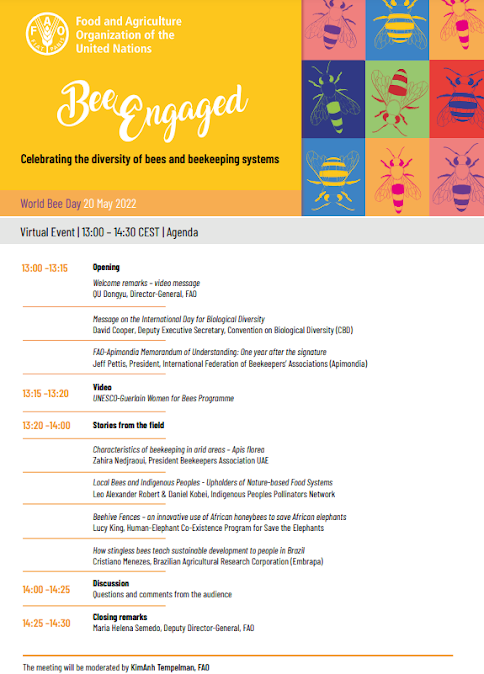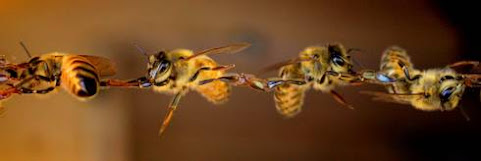FORUM: “Bee inspired by nature to nourish us all.”. World Bee Day 2025. This year’s theme will underscore the critical roles of bees and other pollinators in agrifood systems and the health of our planet’s ecosystems. Bees and other pollinators are essential for our existence, sustaining agriculture and biodiversity worldwide. With over 20,000 species of bees and various other wild pollinators, they face challenges from human activities, such as habitat loss, pesticide use, and climate variability. Our world would be a very different place without bees and other pollinators! These amazing creatures are vital to our existence, and we owe them so much. Without pollinators, our diets would be very different, and so would our agriculture and biodiversity. Since 2018, World Bee Day has been an occasion to celebrate these tiny miracle workers globally. In 2025, under the theme "Bee inspired by nature to nourish us all", the World Bee Day celebration will shine light on the vital roles of bees and other pollinators in ecosystem restoration, biodiversity conservation and food security and nutrition. It is thanks to the over 20 000 bee species and various other wild pollinators that we can produce most of the crops we eat. These range from butterflies through birds and bats to other unsung heroes of pollination such as several species of monkeys, rodents, lemurs, tree squirrels, olingo and kinkajou. In fact, they pollinate 87 out of 115 world's leading food crops. In addition to their contribution to agricultural production, pollinators play an important role as indicators of ecosystem’s health. Their cyclical presence or absence signal changes that affect the entire ecosystem, for instance. This World Bee Day celebration is a unique opportunity to appeal to beekeepers, pollination experts, researchers, policy makers, Indigenous Peoples, industry representatives, civil society organizations and individuals from around the world to:
- Raise awareness – Disseminate information on the importance of bees and other pollinators to food security and nutrition and environmental sustainability.
- Foster collaboration – Establish a "Friends of Bees and Pollinators" network to drive global and local action.
- Promote nature-positive and agroecological approaches – Advocate for pollinator-friendly practices and policies at national and international levels.
- Showcase creativity, traditional knowledge and innovations – Highlight outputs of groundbreaking research, Indigenous Peoples’ knowledge and practices for the conservation and sustainable use of pollinators, and sustainable beekeeping initiatives that support communities and livelihoods.
Together, let’s amplify and reinforce the contributions of bees and other pollinators to resilient agrifood systems and highlight the vital roles of all actors in conserving and sustainably managing them. Follow the conversations with the hashtags: #worldbeeday, #20May, #SavetheBees.
EVENTS: From May 20 to 22nd, to mark the World Bee Day 2025. The Government of Slovenia and FAO organize the International forum for action on sustainable beekeeping and pollination; This year's theme "Bee inspired by nature to nourish us all", focus on the critical roles bees and other pollinators play in agrifood systems and the health of our planet's ecosystems. Indeed, pollinators are increasingly threatened by habitat loss, unsustainable agricultural practices, climate change and pollution. Their decline jeopardizes food production, increases costs and exacerbates food insecurity, particularly for rural communities. The Second International Forum for action on sustainable beekeeping and pollination will open with a celebration of World Bee Day 2025 and will provide a platform to exchange knowledge, showcase innovative beekeeping initiatives, inspire global action for pollinator-friendly agricultural practices, and coordinate efforts to conserve and protect pollinators worldwide.
From (09:00 – 10:00; Ethiopia time, UTC+3) - Opening of the World Bee Day 2025.
Moderator: Yurdi Yasmi, Director of Plant Production and Protection Division, FAO.
Keynote addresses may include:
From (11:00 - 12:00; Ethiopia time, UTC+3). Raising awareness and screening of animated film for the youth.
This opening is part of the Second International Forum for action on sustainable beekeeping and pollination, a three-day event from 20 to 22 May 2025. A selection of photos submitted to the FAO World Bee Day contest will be on display at the event in Jimma, Ethiopia. The contest was held to highlight the invaluable connections between pollinators, ecosystems and agrifood systems, and to raise awareness on the importance of protecting bees and their habitats. The event is public, and everyone is welcome to participate online. Tune up to watch the livestream!
INITIATIVES: Learn about the FAO's Global Action on Pollination Services for Sustainable Agriculture and about the TECA - Technologies and Practices for Small Agricultural Producers. Explore the gallery photos and for further informations, please contact world-bee-day@fao.org.
PUBLICATIONS: Guidance, tools and analysis on bees and other pollinators.
STATEMENTS: Read the message of the Executive Secretary of the Convention on Biological Diversity on World Bee Day 2025; May 20th.
"This call is extended to all Member Nations, international and regional organizations, civil society, leaders of Indigenous Peoples, researchers, the private sector, everyone working in the sector and anyone with an interest in bees and other pollinators to get involved, share their experiences and show how important these pollinators are," says Yurdi Yasmi, Director of the FAO Plant Production and Protection Division.
CAMPAIGN: Join the call for Preserving Bees!
Keynote addresses may include:
- His Excellency Moses Vilakati, Commissioner for Agriculture, Rural Development, Blue Economy, and Sustainable Environment, African Union Commission (AUC) (TBC).
- Astrid Schomaker, Executive Secretary of the Convention on Biological Diversity (CBD) - video message.
- Rita Bissoonauth, Director of the United Nations Educational, Scientific and Cultural Organization (UNESCO) Liaison Office in Addis Ababa, Ethiopia.
- Her Excellency Mateja Čalušić, Minister of Agriculture, Forestry and Food of Slovenia - video message.
- Abebe Haile-Gabriel, Assistant Director-General and Regional Representative for Africa, FAO.
- QU Dongyu, Director-General, FAO - video message.
- His Excellency Girma Amente, Minister of Agriculture Ethiopia.
- Guest of Honour – Government of the Federal Democratic Republic of Ethiopia (TBA).
From (11:00 - 12:00; Ethiopia time, UTC+3). Raising awareness and screening of animated film for the youth.
- Short remarks by Farayi Zimudzi, FAO representative in Ethiopia and Subregional Coordinator for Eastern Africa and Representative to the AU and UNECA, ad interim, addressing the youth prior the film screening
- Short remarks by Yurdi Yasmi, Director, Plant Production and Protection Division (NSP), FAO
- Presentation of animated film entitled “Asali: Power of The Pollinators” by Maya Penn, Film Director and Chief Executive Officer (CEO), “Maya's Ideas 4 The Planet” (online)
- Screening of animated film “Asali: Power of The Pollinators”
- Q&A session
This opening is part of the Second International Forum for action on sustainable beekeeping and pollination, a three-day event from 20 to 22 May 2025. A selection of photos submitted to the FAO World Bee Day contest will be on display at the event in Jimma, Ethiopia. The contest was held to highlight the invaluable connections between pollinators, ecosystems and agrifood systems, and to raise awareness on the importance of protecting bees and their habitats. The event is public, and everyone is welcome to participate online. Tune up to watch the livestream!
INITIATIVES: Learn about the FAO's Global Action on Pollination Services for Sustainable Agriculture and about the TECA - Technologies and Practices for Small Agricultural Producers. Explore the gallery photos and for further informations, please contact world-bee-day@fao.org.
PUBLICATIONS: Guidance, tools and analysis on bees and other pollinators.
STATEMENTS: Read the message of the Executive Secretary of the Convention on Biological Diversity on World Bee Day 2025; May 20th.
"This call is extended to all Member Nations, international and regional organizations, civil society, leaders of Indigenous Peoples, researchers, the private sector, everyone working in the sector and anyone with an interest in bees and other pollinators to get involved, share their experiences and show how important these pollinators are," says Yurdi Yasmi, Director of the FAO Plant Production and Protection Division.
CAMPAIGN: Join the call for Preserving Bees!
Let’s together Inform, educate and engage audiences with real facts. Join the“Bee inspired by nature to nourish us all.” campaign by raising awareness about the need to protect bees and other pollinators.
COMMUNICATION MATERIALS: Explore the 2025 Guide for ideas and practical ways to participate in the global campaign, dive into the Digital Media Hub to download the posters, the web banners, the web buttons, the visual background, the gadgets and use the resources to plan your participation.






















